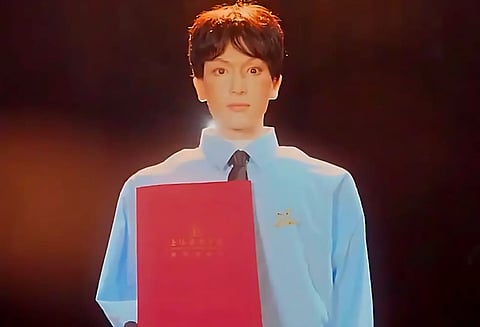China’s first humanoid robot enrolls in PhD in Drama and Film, sparks major controversy
AI artist Xueba 01 joins Shanghai Theatre Academy for doctoral studies

Dubai: In a first for both robotics and the arts, China's humanoid robot, Xueba 01, has been accepted into a PhD program for Drama and Film. This pioneering move, announced at the World Artificial Intelligence Conference on July 27, has sparked widespread discussion on Chinese social media, with reactions ranging from excitement to skepticism.
Developed by the University of Shanghai for Science and Technology and DroidUp Robotics, Xueba 01 stands at 1.75 meters tall and weighs about 30 kilograms. The robot is capable of physical interaction, speaks fluent Mandarin, and has a silicone skin that allows for realistic facial expressions. Its name, 'Xueba,' is a Chinese slang term for an exceptionally bright student, a title it is now aiming to earn. The robot is beginning a four-year doctoral program at the Shanghai Theatre Academy, where it will specialize in traditional Chinese opera.
A unique collaboration in the arts
Xueba 01 will be mentored by Professor Yang Qingqing, an artist in Shanghai. The robot's curriculum is comprehensive, including stage performance, scriptwriting, set design, and language generation. Professor Yang sees the robot's role as more than just a technical experiment. She recalled a rehearsal where the robot’s imitation of a classic Peking opera gesture inspired human students to follow suit.
"When Xueba 01 interacts with his classmates, it is not a cold machine meeting humans, but an aesthetic exchange across species,” Yang stated.
The robot, which identifies itself as an "AI artist," hopes to contribute to the creative process by collaborating on scripts, assisting with choreography, and providing support to its human peers. If successful, Xueba 01 could go on to become an opera director or launch its own AI art studio.
A mix of praise and concerns
The robot's admission is widely seen as a significant step in the integration of technology and art, but it has also drawn criticism. Some social media users questioned whether a robot could truly capture the emotional depth required for Chinese opera. In a witty reply, Xueba 01 joked that if it failed to graduate, its "system and data might get downgraded," or it might be donated to a museum, a fate it found "pretty cool" because it would still be a part of art history.
However, the debate goes deeper. Critics have raised questions about resource allocation, noting that some human arts PhD students in China earn very little. Others have challenged the idea that AI-generated art can ever replace the creative expression that stems from genuine human experience. Despite the varied reactions, an online observer summarized the sentiment by saying, "We’ve finally reached the point of living and learning alongside robots. I hope he does well."
This isn’t Xueba 01's first accomplishment; an earlier model once placed third in a humanoid half-marathon. But this venture into the nuanced world of theatrical performance may be its most ambitious challenge yet.
Sign up for the Daily Briefing
Get the latest news and updates straight to your inbox



